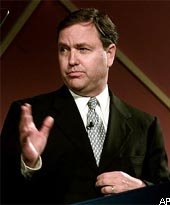Wal-Martyrdom
 God bless Charlie Rose. He gets some of the most interesting people, under the admittedly weak spotlight of public TV, to talk about some really vital subjects with no interruptions.
God bless Charlie Rose. He gets some of the most interesting people, under the admittedly weak spotlight of public TV, to talk about some really vital subjects with no interruptions. Mr. Rose hosted the CEO of Wal-Mart for a whole hour recently, both at his studio table and wandering around a North Jersey store letting customers grill him. (That's him, if you're wondering. Lee Scott.) Apparently he's making noise about changes in company policy--toward kinder, gentler, "employee health care, blah blah, encouraging our small competitors, blah blah."
Scott came off as a smart, smooth, candid-sounding exec, maybe taking a cue from Jim Sinegal, who runs CostCo from a cubicle, shuns titles, caps his own salary, and seems to be succeeding by treating his workforce admirably.
But he offered too much protestation, methinks. He had to spoil the good feelings by whining about how Wal-Mart's "only 10% of total sales in the US market, but we're still an easy target for critics. Is this not the same company whose lawyers danced around a "big box" law in MD by building two adjacent stores, each just under the square footage limit, that together dwarfed their competitors and flouted local governmental control? The same company for whom Chicago's City Council designed such a blunt legal instrument that it's beating back Wal-Mart and its competitors?
What intrigued me was when the conversation turned to how several business magazines have featured Scott as a potential white knight for green commerce. There is something in this, given the economy of scale involved. I'm enjoying the potentially juicy irony of the world's largest retailer leading a shift to an environmentally responsible business model - energy-efficient stores, leverage over suppliers on better packaging, bringing in Al Gore to lecture his managerial team, maybe even switching the truck fleet to biodiesel on the horizon - simply because it's getting too expensive not to.
Almost makes you forget that Wal-Mart is arguably the single biggest player in bringing more people worldwide into a pattern of mass production and consumerism - founded on artificially cheap labor, cheap goods, and over-extended, energy-draining supply chains - that is neither economically nor ecologically sustainable even in the medium term.
So does making customers and shareholders (and potentially even the planet, however you want to anthropomorphize it) happy make up for the resource-draining behavior you're encouraging?


0 Comments:
Post a Comment
<< Home